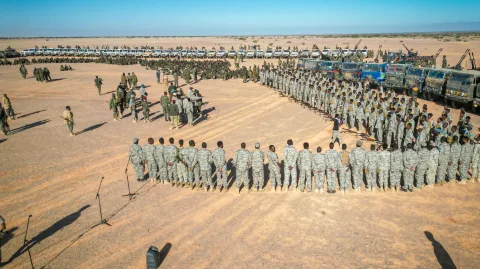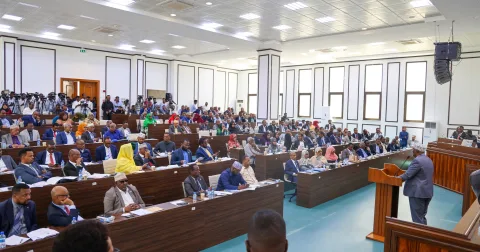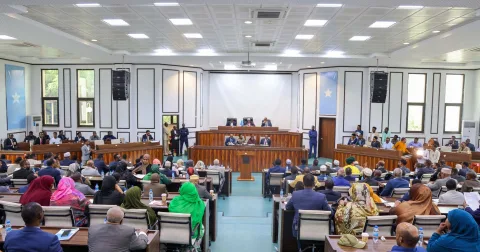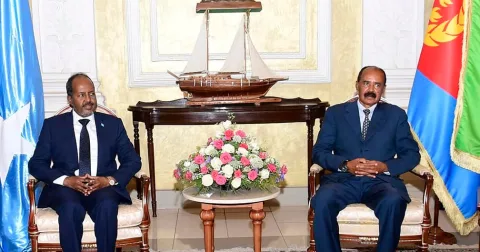Somalis are divided into two camps with opposing political concepts; Centralism and Federalism. However, there is a third group in Somalia’s political realm
 The die is now cast. Julius Caeser; The Crossing of river Rubicon; 49 B.C.
The die is now cast. Julius Caeser; The Crossing of river Rubicon; 49 B.C.
“We, Somalis, are notorious to declare cessation of hostilities with heated, bellicose and imperious overtures and gestures but it is downright hypocrisy when some of us demand compromise long after we had deliberately squandered all chances of compromise”. Islaan Mohamed Islaan Muse; Garowe; June 1991.
“Somali nationalism, brotherhood, trust and unity was crippled in the war between the military government and the armed factions and as the result Somali nationhood was sent to its early grave in the 1991 tribal war”. Adan Jama; Adis Ababa Reconciliation Conference; March 1993.
Introduction
I live in the hotbed town of Somali federalism (Garowe) and I have to admit that I am not immune to the political persuasions of Federalists, their pervasive aversion to centralism and their terror-stricken rejection of dictatorship. But paradoxically, I favour a unified strong representative inclusive central government in Mogadishu to safeguard the unity, territorial integrity and sovereignty of Somali nation. Therefore I will call myself “patriotic Federalist”.
At last, Somalis are divided into two camps with opposing political concepts; Centralism and Federalism. However, there is a third group in Somalia’s political realm; Secessionism, who somehow possess Federalism inclinations. For the sake of clarity, I will use the word “Centralists” to refer to the leadership of the central government in Mogadishu and “Federalists” to Puntland political leaders in Garowe who ostentatiously symbolise the ideals of Federalism. I will call the political leaders of the self-declared Republic of Somaliland in Hargeisa as “Secessionists”.
These terms do not necessarily reflect the political tendencies or natural propensities for these concepts of the people living in those towns nor do they describe traditional ideologies embedded in the Somali people’s psyche. I have used these terms knowing well that they could be illusive or incorrect to depict the present Somalia’s political camps and the fact that the political leaders who espouse these ideals may not fully comprehend them, their advantages and disadvantages. One may not be surprised to find Federalism proponents in Centralism strongholds of Mogadishu, Adado or Baydhabo and, by the same token, die-hard Centralism ideologues treading in the streets of the Federalism breeding ground of Garowe.
It may well be true that religious groups such as Al-Itihaad, Ictisaam, Dam-U-Jadiid and terrorists Al-shabaab have all one thing in common; a preference for an autocratic top down approach system of government. Moreover, some of the Federal Member States’ political leaders who could well fall into Federalist category such as Ahmed Madoobe of Jubbaland and Abdikahim Guled of Galmudug ascribe to the notion of having strong unitary state system. It is equally true that the more liberal leaders and groups in many parts of the country, be it in Mogadishu, Hargeisa or Garowe, such as Ahmed Siilaanyo, Abdiweli Gas and Sharif Hassan seem to prefer Federalism as suitable system of government in Somalia.
That said, I have a genuine nagging fear for the future of Somalia. The war of words between Centralists, Federalists and Secessionists in Somalia’s political debate is now morphing into irreversible stalemate that may inevitably and inadvertently lead to nationwide conflagration. The battle lines are drawn and the duel date is set between September 2016 and August 2020. It will neither be fought to decide the electoral model in August 2016 nor who will lead the nation from September 2016 but rather over the governance structure and political direction of the nation from September 2016 and beyond. In nutshell it will be over;
- The unity of the nation: Secessionists versus the Centralists and Federalists.
- The powers of the Federal government and Federal Member States (Federalism or unitary state): Centralists versus the Federalists and Secessionists.
- The future status of the nation’s capital city: Unsettled contentious issue among different Somali tribes.
- Secessionists will compromise but demand for confederation
Secessionists hail mainly from north western regions of Somalia. They are hell-bent on dividing the nation and vehemently advocate for the breakaway of Somaliland as an independent republic. In the past the secessionist attempted to use their short but significant history as a separate British protectorate prior to the birth of Somali nation and the historic atrocities against them perpetrated by the military regime of late Siyad Barre as their main legal grounds to seek independence. They have established peace and security in the regions they control, instated law and order, developed unique advanced political and governance structures and developed close friendship and cooperation with a number of countries namely Ethiopia to advance their cause but to no avail. They tried to twist the weak Federal government’s arm to become sympathetic to their case and recognise their independence in Somalia – Somaliland talks in Turkey but with little or no success.
The Secessionists have succeeded to stay away from the murky and anarchic political infighting in the Southern regions. They scored a goal in the Somalia New Deal Compact with the recognition of their separate and unique position in Somalia and their political and development stage by the International community in the Somaliland Special Arrangements. However, the Secessionists have yet to realize their dream of independent statehood.
In the period between 2016 and 2020, the leaders of the Secessionist camp will change tactic. On the one hand they will continue to lobby the international community by drawing attention to their peace and stability, developed democratic government institutions and strategic political and geographical importance. On the other hand they will keep their distance from the South and even will drive a wider wedge between the Somali people in the South and the North. In the Somalia – Somaliland talks they will attempt to press ahead forcefully with their demands for independent statehood. If they fail to get recognition, they will accept nothing less than a compromise agreement to renegotiate Somali national unity; confederation and equal sharing of power and resources between the South and the North.
Centralists have a mission
Centralists loathe the idea of “a political system in which there is a division of powers between two levels of government of equal status”. They had grown up in the era of the totalitarian military regime of Mohamed Siyad Barre. Centralist have a clear mission, a coordinated plan and strong leadership under President Hassan Sheikh Mohamuoud. They are close-knit team (Farah A/Qadir, Odawa, Abdihakim Guled, Abdi Aynte and others) and understand what is at stake in Somalia rather well.
After the formation of Jubbaland and South West Federal Member States, the Centralists have changed colour and now disguise themselves as “Federalist nationalists”. They coined the deceptive but appealing mantra of “our national interest to build a strong Federal (central) government in the national level and devolved government in the local level”. Their irrevocable ultimate goal is to gradually transform the Federalisation process into devolved unitary state system and concentrate power and resources in the hands of the central government in Mogadishu. They have developed a number of plans to derail the strengthening of Federalism, recoup some of the powers from the Federal Member States and upset sharing of power, resource and decision making in future Federal Somalia. Their plausible but rather devious schemes include;
The Guul Wade plan:
- This plan was developed to help rebuild the Somali National Army and integrate various armed militias under one common command in Mogadishu. The Centralists argue that without strong Somali National Army, Alshabaab will never be defeated. This is in clear contrast with the tried and tested strategy of mobilising and supporting local grassroots movement and strengthening the regional administrations to fight against Alshabaab. Somaliland and Puntland are excellent examples of the successful fight against Alshabaab at the local level.
- The Federalists believe that it is impossible to rebuild Somali National Army without genuine truth and reconciliation among Somali people, agreed political settlements in the future form of government and power and resource sharing.
The Heegan Plan
- The Centralists put together this plan to centralise the Somali Police Force under one command. This plan could be challenged legally as it has got no place in the new Somali Federalism. Policing is the sole responsibility of the Federal Member States as outlined in the Provisional Federal Constitution.
The formulation of centralised Somali National Development Plan (NDP).
Centralists are jostling to set the development agendas and policies in order to determine the outcome, utilize the central government power of patronage and control the donor funds. In the new Somali Federalism, State development plans and policies have to be drafted at the local level and collated in the national level to formulate a national development plan where the Federal Member States have the expressed powers to prioritise their development needs.
The review and completion of the Provisional Federal Constitution.
The Centralists unilaterally embarked on the task of reviewing and completing the Provisional Federal Constitution. They have removed or amended a number of important provisions for Federalism and introduced articles granting sweeping powers to the Federal government (Central government). This will be the main bone of contention between Centralists and Federalists in the next four years.
To avoid collisions and ambiguities, The constitution needs to provide a clear division of powers, assigning exclusive powers to the national government and exclusive powers to the Federal Member States while at the same time defining the decision making process on shared or concurrent powers.
The Centralists will face stiff opposition from the Federalists in the review and completion of the Provisional Federal Constitution. In the Istanbul communique on 24 February 2016, recognising the importance of this exercise, the international community urged “the Federal Government to engage the emerging and federal member states in the constitutional review and implementation process and conduct nationwide consultations with Somali people across all federal and emerging member states, including through civic education and outreach to ensure broad-based consensus and Somali ownership”
The centralisation of Federal Member State’s powers
The Centralists are making attempts to centralise the social services of Federal Member States such as education (e.g. centralised Secondary Education Leaving Certificate), custodial corps, judiciary, energy, water and telecommunication.
Federalists lack strong leadership.
Federalism was proposed as a suitable system of government to end the ceaseless strife between Somali tribes. Its original recommendations were based on the lessons learnt from the 21 years of dictatorship and the decades of ensued civil war. It was aimed to bring government, decision making and provision of social services closer to the people, prevent tyranny, foster sense of attachment and closer ties to the home states, conserve regional identity, safeguard individual liberty and ensure that autonomous States could function independently when one group usurps the power and takes control of the parliament, the executive and the judiciary in Mogadishu.
This latter political objective of Federalism is in action at the moment as the branches of the Federal government in Mogadishu are controlled by one group, Dam-U-Jadiid and the Federal Member States such as Puntland are functioning independently from the centre and advocating for the interests of its citizens.
Today the Federalists suffer from weak leadership and are in some sort of disarray under President Abdiweli Ali Gas. The people of Puntland are confused of President Abdiweli’s political beliefs. Some people publicly question his sanity and criticise his ignorant display of some residual centralist penchants. This is understandable, as he spent time in Mogadishu as a former Federal government minister and prime minister and finds himself unsure or unaware of what he stands for.
The Federalists dream of Somalia where decision making, power and resources are shared fairly and amicably and where principles of coexistence, consultation, compromise and cooperation are entrenched and respected in national and local political and social interactions. Their biggest bargaining chips are the support of their people for Federalism and their absolute control over their territories as opposed to the weak position of the Centralists who do not control any land outside of Mogadishu.
The only strategy and action of the Federalists at the moment is to protest, boycott and furnish press releases. They seem paralysed by their lack of clear forward vision and are split between their responsibilities to support the country to move forward and their duties to protect the local autonomy of their State. Now the battles is taken to their turf, they have no other option but fight.
Conclusion
The friction behind this impending war – the Centralists’ and Federalists’ fear of losing power, political dominance and supremacy – can hamper the political and security progress Somalia has made in the last few years. If this squabbling, scheming and disagreements continue, the next four years will see the greatest political debacle in Somalia and will risk to set the country back into the past anarchy and statelessness. It could herald new heightened tension and war between the Federal government and the Federal Member States. It will be a victory for Al-shabaab and a disappointment to the international community.
It is incumbent on every Somali, specially the Somali youth, to oppose these political leaders (Centralists, Secessionists and Federalists) and force them to come up with a compromise model, a middle ground, that can strike a balance between the Centralist, Secessionist and Federalist ideologies, a balance that can ensure a unified, strong federal Somalia which recognises and celebrates the diversity of its people, cultures and regions and uniqueness of each of its constituent parts. A middle ground that can bring Somaliland on board and make provision for its political, economic and social position in a unified Federal Somalia. A middle ground of cooperation, shared vision, shared responsibilities and shared ownership of decision making process among the Federal Member States and the Federal government.
By Abdiwahab Diriye
Abdiyare.diriye@gmail.com





